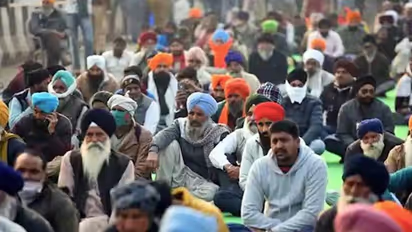
The government’s decision of direct online payment of the minimum support price (MSP) for the upcoming rabi marketing season (RMS) is a fantastic decision, a top market analyst has said.
Seasoned market analyst Deepak Talwar said the government’s decision, which came amidst the ongoing farmers’ protests and increased minimum support price (MSP) procurement for paddy in Punjab will be a game-changer.
“Agriculture is India’s biggest occupation and the government has pushed a smart decision to allay the fears of the farmers,” said Talwar.
The Food Corporation of India (FCI) has written to the Director of food, civil supplies, and consumer affairs in order to request the land records of farmers to ensure direct bank transfer of MSPs for the approaching procurement season. FCI further said the land records were made mandatory for wheat procurement and that the records must be updated before the commencement of the RMS 2021-22.
“Punjab, which was once the land of India’s green revolution, is an important state when it comes to MSP procurement of wheat and paddy along with a few other crops in relatively smaller amounts. The government’s move will definitely help the farmers,” he added.
As per records, 90 percent of the produced paddy crop was procured and 66.4 percent of the wheat crop was procured in 2017-18. Punjab’s share in national wheat and rice production is 18 per cent and 12 per cent respectively. In the central pool that year, Punjab’s wheat share stood at 38 percent and rice’s share was 31 percent. Deepak Talwar said that it is heartening that Punjab’s critical share is reflected in the FCI procurement.
For RMS 2019-20, of the 40.37 lakh metric tonne (LMT) wheat procured by the FCI, 15.72 LMT came from Punjab. For the Kharif marketing season (KMS) of 2019-20, of the 7.52 LMT paddy procured, 2.24 LMT came from the northern state that borders Pakistan. According to reports, for RMS 2020-21, of the 38.66 LMT wheat procured by the FCI, 14.20 LMT came from Punjab. For KMS 2020-21, of the 6.03 LMT paddy procured by the FCI, 2.69 LMT came from Punjab.
Talwar also said that the government’s directive to ensure direct MSP transfers to farmers has been pending for a long time. It needs a mention here that in 2012, the then Shiromani Akali Dal-Bharatiya Janata Party (SAD-BJP) government ignored the directive of the Union government, and continued the MSP for farmers through the commission agents and middlemen, or arhtiyas.
“It needs to be mentioned here that Punjab excused itself by claiming that the machinery to facilitate direct transfers was not available. The state government had then said it was easier to deal with 20,000-odd middlemen instead of more than 1.2 million farmer families. The FCI had also requested the option to directly pay the farmers back in 2012,” said Deepak Talwar.
The Punjab Arhtiya Association - expectedly - has not liked the FCI request on land records for the farmers of Punjab, and threatened a strike and stated that they shall stop wheat procurement from April 2021 as a mark of protest.
He said that the government’s decision addresses three major concerns. One, that of continued MSP procurement, as farmers selling their crop to the FCI, and in the future, even to the state agencies, can expect complete payment in their banks. Secondly, a fixed fee for the middlemen in recent KMS instead of an MSP-linked fee will aid the FCI in reducing its procurement costs. And finally, it frees the farmers from the clutches of the middlemen,” said Talwar.
For generations, the middlemen or the arthiyas have facilitated the trade between the farmers and the agencies at the mandis. Under the APMC system, payment in Punjab still goes to the middlemen and not the farmers.
“The government decision opens up opportunities for formal credit for farmers in the future. Banks will be able to gauge the credit worthiness of the farmer, enabling them to offer multiple financial services. Farmers can also access loans for several services at a lower rate of interest. More importantly, the farmers will come out of the middlemen’s curse,” Deepak Talwar added.